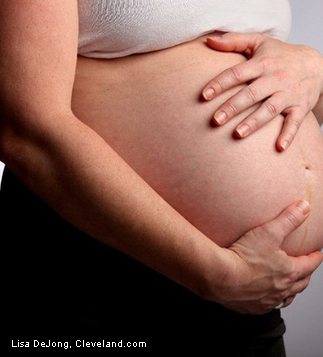How Do Celiac Disease and the Gluten-Free Diet Impact Pregnancy?
 Have you thought about how celiac disease could affect your pregnancy?
Have you thought about how celiac disease could affect your pregnancy?
Hannah Drown, cleveland.com 1
There are few times in a woman’s life when she’s more aware of her health than while she’s pregnant. And a big part of ensuring proper health during this time is to make sure the right nutritional guidelines are being followed.
- But what if those guidelines are already mapped out by a disease such as celiac disease?
- How does a person manage dietary restrictions while still achieving prenatal nutritional goals?
- And what’s worse during pregnancy, cutting out a large part of your diet or ignoring the restriction?
The answers to these questions are incredibly important and are things many women with celiac disease begin to ask when they start the process of growing their family.
“Because I have celiac disease, I was initially very concerned about my ability to conceive and carry a healthy baby to full-term,” Gluten-Free Hungry Gal blogger Brynne Cramer said to Gluten Free Living.
Even those who don’t know much about pregnancy know getting the right vitamins during the process is vital. Unfortunately celiac disease is already known to cause deficiencies in zinc, selenium and folic acid, so those who are pregnant and suffering from the disease need to pay special attention to these three vitamins.
But it goes even deeper than that.
- “Undiagnosed/untreated mothers are at higher risk for miscarriage, infertility, intrauterine growth retardation, low birth weight babies, and stillbirth due to malnourishment,” according to Lauren Hoffman of Bastyr University, as reported by gluten.org.
There’s good news, however. Those risks are for people with celiac disease who are not following a gluten-free diet.
- By making the diet change, pregnancy problems associated with celiac disease are greatly lowered.
So much so that a study found 85 percent of women with celiac disease who miscarried did so before they were diagnosed, and therefore before they went gluten-free.
- “Untreated celiac disease was associated with various reproductive disorders, but that relationship disappeared after the patients started a gluten-free diet,” according to Human Reproduction Update, as reported by celiac.org.
“The authors found that women with untreated celiac disease had both a shorter fertile lifespan as well as a shorter breastfeeding period, but after treatment with a gluten-free diet, the patients returned to normal.”
As always, consult your doctor to come up with a personalized nutritional plan for your pregnancy. But be aware celiac disease is an important topic to discuss. It can cause issues while working to grow your family but with the proper guidance, it doesn’t have to.
1 https://www.cleveland.com/entertainment/index.ssf/2018/05/how_does_celiac_disease_impact.html
Reporter Hannah Drown writes a weekly column about gluten-free living for cleveland.com. She has been gluten-free since she was diagnosed with celiac disease in 2011. You can read more of the Gluten-Free series here on cleveland.com or on Drown’s Facebook page.







